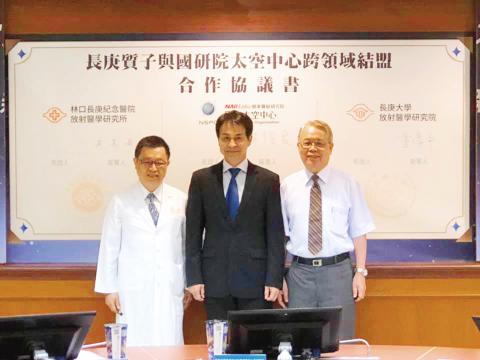The National Space Organization (NSPO) yesterday signed memorandums of agreement with Linkou Chang Gung Memorial Hospital and Chang Gung University to boost the nation’s capabilities in radiation testing of satellite components and space industry development.
The documents were signed by NSPO Director-General Lin Chun-liang (林俊良), the hospital’s Proton and Radiation Therapy Center convener Hung Ji-hong (洪志宏) and the university’s Institute for Radiological Research dean Tung Chuan-jong (董傳中).
Electronic components used in satellites have to be resistant to space radiation, which can disrupt electronic signals or cause systems to work incorrectly or even break down, the NSPO said.

Photo: CNA
The hospital in November 2015 set a milestone in cancer treatment by putting four proton radiotherapy devices — the world’s most advanced — into clinical service, the organization said.
The hospital also set up a particle physics and beam delivery core laboratory for research purposes, such as electronic component testing, the NSPO said.
Radiation testing of satellite components in simulated space conditions include total radiation dose testing and proton radiation testing, NSPO Deputy Director-General Yu Shiann-jen (余憲政) said.
While total dose testing can be performed at National Tsing Hua University’s Nuclear Science and Technology Development Center, only the Atomic Energy Council’s Institute of Nuclear Energy Research can conduct proton radiation testing, but its facilities cannot meet the requirement of testing up to 150 mega-electron-volts (MeV), he said.
Previously, the NSPO had to ask foreign institutions, such as Texas A&M University or the University of California, Berkeley, to conduct tests, which took months and involved costs up to hundreds of thousands or even millions of New Taiwan dollars, he said.
The hospital’s facilities allow testing up to 150MeV, which would greatly improve the testing efficiency of locally developed components, Yu said.
The NSPO would serve as a consultant for Chang Gung institutions in matters related to space technology, while the institutions would charge component developers for testing, he said.
In related news, the NSPO is to exhibit key component models of remote sensing satellite Formosat-5 and the Triton microsatellite, part of the Formosat-7 array, in a technology show in Indonesia in September organized by the Taiwan External Trade Development Council.
Formosat-5, the nation’s first domestically developed satellite, was launched on Aug. 25, 2017, form California, the Triton weather satellite, of which most key components were developed by Taiwanese scientists, is scheduled to be launched in 2021.
Indonesia is a major player in space technology in Southeast Asia after India, and it also aspires for autonomous satellite development, Yu said, adding that the NSPO looks forward to more collaboration with the country.

Global bodies should stop excluding Taiwan for political reasons, President William Lai (賴清德) told Pope Francis in a letter, adding that he agrees war has no winners. The Vatican is one of only 12 countries to retain formal diplomatic ties with Taiwan, and Taipei has watched with concern efforts by Beijing and the Holy See to improve ties. In October, the Vatican and China extended an accord on the appointment of Catholic bishops in China for four years, pointing to a new level of trust between the two parties. Lai, writing to the pope in response to the pontiff’s message on Jan. 1’s

A Vietnamese migrant worker on Thursday won the NT$12 million (US$383,590) jackpot on a scratch-off lottery ticket she bought from a lottery shop in Changhua County’s Puyan Township (埔鹽), Taiwan Lottery Co said yesterday. The lottery winner, who is in her 30s and married, said she would continue to work in Taiwan and send her winnings to her family in Vietnam to improve their life. More Taiwanese and migrant workers have flocked to the lottery shop on Sec 2 of Jhangshuei Road (彰水路) to share in the luck. The shop owner, surnamed Chen (陳), said that his shop has been open for just

TAKE BREAKS: A woman developed cystitis by refusing to get up to use the bathroom while playing mahjong for fear of disturbing her winning streak, a doctor said People should stand up and move around often while traveling or playing mahjong during the Lunar New Year holiday, as prolonged sitting can lead to cystitis or hemorrhoids, doctors said. Yuan’s General Hospital urologist Lee Tsung-hsi (李宗熹) said that he treated a 63-year-old woman surnamed Chao (趙) who had been sitting motionless and holding off going to the bathroom, increasing her risk of bladder infection. Chao would drink beverages and not urinate for several hours while playing mahjong with friends and family, especially when she was on a winning streak, afraid that using the bathroom would ruin her luck, he said. She had

MUST REMAIN FREE: A Chinese takeover of Taiwan would lead to a global conflict, and if the nation blows up, the world’s factories would fall in a week, a minister said Taiwan is like Prague in 1938 facing Adolf Hitler; only if Taiwan remains free and democratic would the world be safe, Deputy Minister of Foreign Affairs Francois Wu (吳志中) said in an interview with Italian newspaper Corriere della Sera. The ministry on Saturday said Corriere della Sera is one of Italy’s oldest and most read newspapers, frequently covers European economic and political issues, and that Wu agreed to an interview with the paper’s senior political analyst Massimo Franco in Taipei on Jan. 3. The interview was published on Jan. 26 with the title “Taiwan like Prague in 1938 with Hitler,” the ministry